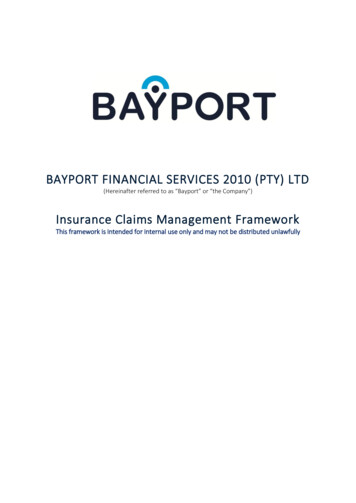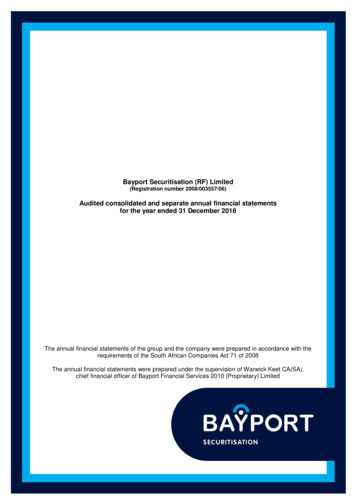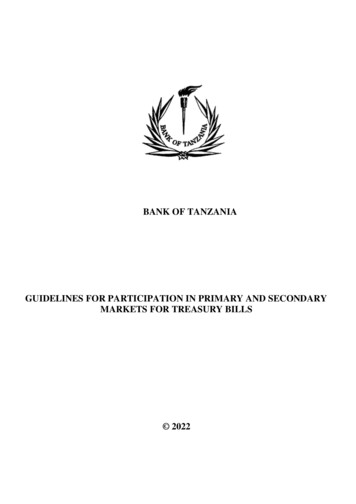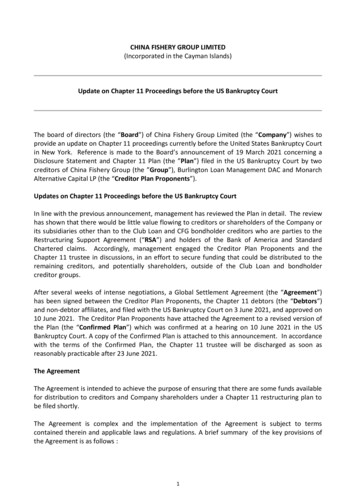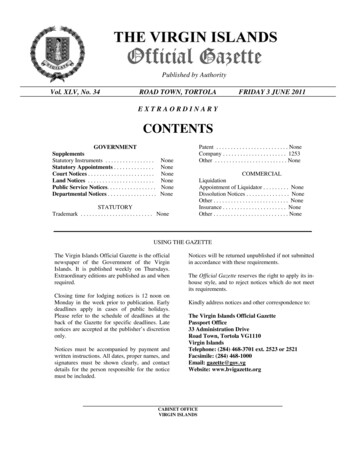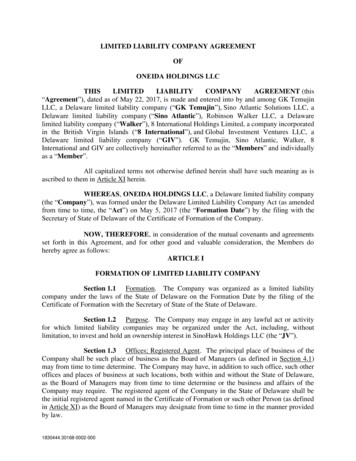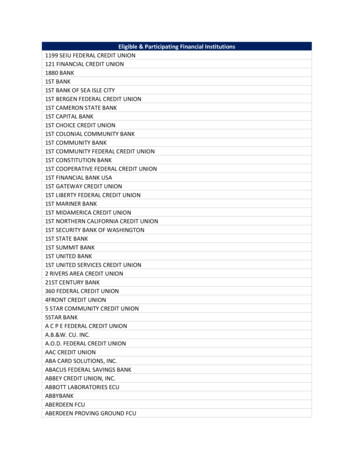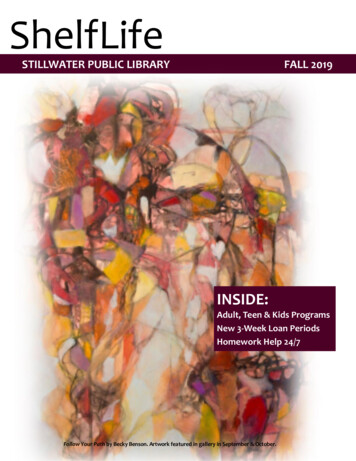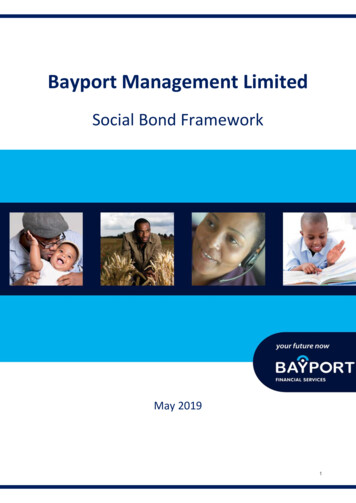
Transcription
Bayport Management LimitedSocial Bond FrameworkMay 20191
An Introduction to BayportBayport Management Ltd. (“Bayport”) wasfounded in 2001 with the aim of making a realdifference in the lives of their clients in emergingand frontier markets. By offering a wide selectionof financial services in markets where access tosuch services are often limited to large groups ofpeople, Bayport is contributing to financialindependence and economic empowerment forboth individuals and small companies.To deliver services suited for a broad client base,Bayportembracestechnology,productleadership and innovation. The company offerstailored savings, transacting, insurance and creditsolutions to individuals and micro and small-sizedenterprises (“MSE”) through an extensivenetwork of branches across Africa and LatinAmerica as well as via online platforms. Thecompany currently operates in Botswana,Colombia, Ghana, Mexico, Mozambique,Tanzania, Uganda and Zambia with a total of 2431branch offices in Africa and 77 in Latin Americawith many branches suited for the delivery of abroader range of financial solutions.2Bayport’s VisionBayport’s vision is to be the most valued financialsolutions brand in its chosen markets byproviding a broad range of unique and relevantfinancial solutions tailored to the needs of itsclients. To achieve this, Bayport aims to engineera new reality in financial services provision; andaspires to be recognised for consistentlydemonstrating the highest standard of care,responsibility and innovation. Bayport aims to bethe first choice for the fulfillment of theeconomically active population’s financial needs– bringing hope, upliftment and financialliberation to the communities that Bayportserves.The Bayport Way“There are many things that make Bayport exceptional, but we think the one thing that really sets usapart is The Bayport Way.The Bayport Way is really our manifesto; it’s the commitment that we make every day to one anotherand to our clients.It is the promise we all stand behind – it’s what pulls us together and reminds us that we are all workingtowards the same thing: That we’re here to help people access financial solutions that they otherwisewouldn’t be able to get; and that these solutions have the power to change their lives.”1Excluding mobile branchesBayport also has an associate company in South Africa, whereBayport holds a 49% ownership22
Bayport’s ProductsBayport’s philosophy is to give people the helpthey need to help themselves. Their products andservices are focused on providing clients with thefinancial ability to change their own lives.Without the services offered by Bayport, many oftheir clients would not be able to invest in lifechanging opportunities such as eneurial businesses. By being an activefinancial partner in underserved areas, theservices offered by Bayport promotes financialindependence and economic growth also in thebroader community.Bayport offers a broad range of financial productsand services which are focused on two corelending products, namely, (i) At Source lendingbeing the vast majority of the book and offered inall countries as the primary financial servicesproduct, this is an unsecured personal loangranted (with the agreement of and in cooperation with an employer) to an employee,typically a government employee and is collectedby way of a deduction At Source; and (ii) Retailloans, being unsecured personal loans originatedthrough agents and Bayport branches andcollected via direct debt from the borrower’sbank account. Both of these core lendingproducts have top line synergies from ancillaryproducts such as insurance, deposit andtransactional products.Below is a summary of all products that areoffered:3
All loans are “self-liquidating loans” in that theclient pays a fixed installment for a definedperiod, amortising the loan to zero over the lifeof the loan. In addition, loans include a consumerprotection policy (Credit Life) as part of themonthly installment that insures the client in caseof death, dread disease and partial protectionagainst retrenchment.As indicated in the table below in respect of FY2018, the average loan values are small for longtenors. This is as a result of very strictaffordability rules enforced by Bayport to avoidover-indebtedness by clients. Clients borrowbetween 700 and 4,500 and typically use thesefunds for poverty alleviation and/or livingstandard improvements.Use of Bayport LoansFunds provided by Bayport to the employedfamily member are used not only by that familymember but also other members of the family inthe family unit.Loans provided for education include financialsupport for school fees, books, stationary, hostelaccommodation as well as school uniforms wheremandatory and therefore required.Loans advanced for housing include financialsupport for buying a plot of land as well asbuilding materials for building a house, homeimprovements or extensions. In frontier markets,houses are often built over long periods aspeople do not have access to finance. For thisreason, clients will use the first loan from Bayportto buy a plot of land and once the first loan isrepaid take a second loan to finance thematerials required to build the house.Alternatively, a loan provided for housing will beused to build an additional room onto theexisting home or to connect electricity to thehouse when it becomes available in the area.Despite the fact that the borrower is employed, asignificant amount of the loans provided toclients are for micro and small-sized enterprises(“MSE”) within the family unit. A teacher, forexample, makes an application for a loan fromBayport to buy a sewing machine for a familymember to become a seamstress or a tailor andby so doing supplements the family income.Another example is the loan providing thefinancial support for a family member to buy amotor vehicle or motor bike and provide themeans to become a taxi or courier service.Alternatively, the partner or the family couldopen a restaurant or buy goods that can be soldat the market or as table top shops. These MSEstypically employ between 1 and 5 employees.In emerging and frontier markets, medical care ismade available to clients by the state. The stateclinics are however often situated far frompeoples’ homes and there are often long waitingperiods for medical treatments which involveextended periods away from work. Clients whoborrow for medical reasons have medical ordental conditions that require specific treatmentsooner than is available by the state. Theseclients would therefore borrow from Bayport inorder to visit a private clinic.4
Bayport’s Distribution ModelAs a part of the Bayport Way, and to create lity”, Bayport uses both fixed branchinfrastructure and mobile branch networks todistribute financial solutions to its clients makingthese products easily accessible to those who arein need of them but may not be able to accessthese products due to geographic location,working hours or transport costs. In addition tothis infrastructure, Bayport is developing digitalsolutions to make access to financial solutionseasier using mobile telephones.The essence of the Bayport physical distributionmodel is a hub and spoke model.In every country, the head office will manage andcoordinate all sales, credit and collectionfunctions centrally. Supporting the head office isa network of physical branches, strategicallylocated not only in the larger cities/towns of acountry but also in the more rural areas. Assignedto some branches are “mobile branches” andassigned to all branches are a certain number ofsales agents.The branch is not only a place for clients to visitand interact/transact with Bayport, but also abase for the sales agents to work from. Theseagents will then go to the surrounding areas, suchas district schools, hospitals, and military bases sothat clients are given access to these services attheir place of work.The reasoning behind this is that people oftenlive and/or work far from a bigger town wherebranches may be located. In order to gain accessto financial services, a borrower would need totake time off work, pay for transport to and fromthe nearest town where a branch may be located.Often the borrower may not have the correctdocumentation and then they would have torepeat this process on more than one occasion.To alleviate this burden, Bayport sales agents willgo to the place of work and process thedocumentation where the borrower will haveaccess to the documentation required for theloan application such as pay slips. In addition, theproof of employment is one of the key creditcriteria, and this requirement is facilitated by theagent being at the place of employment.Typically, Bayport would advertise in advance at aparticular place of employment that they will bevisiting and advise prospective clients of what isrequired in terms of documentation to finalisethe loan application. The cost of the agents’transport, accommodation (if necessary) andother expenses is borne by the company.Once the agent is finished at a particular place,they will return to the branch and submit thedocumentation. Typically, the first level review isperformed by the branch manager to ensure thatthe agent has the correct documentation andthat the affordability levels are correct. Once thatis completed, the documentation will becouriered, scanned or emailed depending on thecountry and the branch location, back to thehead office where the credit team and qualitycontrol team will process and check alldocumentation before disbursement to client.As the digital journey gets underway, in certainmarkets, origination is being done on mobileapplications and tablets with the intention toinclude biometrics, photographs and documentsbeing captured and transferred digitally and inreal time. In addition, loan applications and clientservice can be performed at any of the branches,call centers, by the agents, on the website and/orusing USSD (Unstructured Supplementary ServiceData).Due to the low-income status of the typicalBayport borrower, most do not have assets thatthey can use as security and even though all willhave bank accounts, the banks typically will notlend unsecured to these clients. These clientstherefore have limited opportunities to accessbroad based financial services and are oftensubject to exorbitant bank fees and long waitingperiods for loan disbursement (typically weeks).5
Responsible CreditBayport believes in the positive transformativepower of credit, but is also fully aware of howdestructive over-indebtedness can be. In additionto complying with local consumer protectionlegislation and other applicable laws andregulations, Bayport therefore has in placeseveral internal policies to ensure responsiblecredit practices.Bayport’s strict affordability rules ensure thatclients do not take on debt they cannot afford.Agents make sure that clients understand theterms and conditions of their contracts, as well astheir rights and responsibilities as a Bayportclient.At point of origination, Bayport asks the clientaround the use of the loan in order to help advisethe client around the best tenor based on theiruse. Since there is no price discrimination aroundthe use of loan, Bayport relies on and believesthat the information provided around the use ofthe loan is honest and correct.Consumer education and financial literacy arefurther focus areas in which Bayport provideseducational material in each branch, on websitesand on other digital platforms.Bayport’s commitment toresponsible credit is furtherhighlightedbytheendorsement of the SmartCampaign and its ClientProtection Principles. TheSmart Campaign’s ClientProtection Principles are aligned with Bayport’sown objectives of building strong, lastingrelationships with clients, increasing clientretention and reducing financial risk. Bayport hasnot only committed to the Smart Campaign’sClient Protection Principles, but two of Bayport’seight countries of operation have alreadyachieved Client Protection Certifications from theSmart Campaign; Bayport Zambia and BayportBotswana, which was the first micro-lender inAfrica and the first ever At Source lender toachieve this distinction.Bayport’s Vision, Mission and Values are mappedbelow:6
In 2017, Bayport Colombia received a GLOBALIMPACT INVESTING RATINGS SYSTEM (GIIRS) 101Impact Company Rating. GIIRS Ratings are thegold standard for impact measurement in impactinvesting. They are rigorous, comprehensive, andcomparable ratings of a company or a fund'ssocial and environmental impact.This rating is broken down further into two subsegments, the Impact Model Rating and theImpact Operations Rating.The Impact Model Rating recognizes businessmodels that are specifically designed to solvesocial or environmental problems throughcompany products or services, target clients,value chain, ownership, or operations. Thegrading levels are Bronze, Silver, Gold andPlatinum over numerous categories. BayportColombia received a Gold overall rating as well asa Platinum rating for Client Impact.The Clients Impact Area evaluates the company'svalue to their direct clients and the consumers oftheir products or services and the impact of theseproducts or services to the clients and the extentto which they benefit underserved communities.Bayport Colombia also achieved the highestpossible rating for Governance underthe Operations Rating. The Governance Impactarea evaluates a company’s vision, mission,ethics, accountability and transparency.Changing LivesBayport provides its clients with a chance at abetter life by not only focusing on short-termcash flow relief, but by helping them along theroad towards sustainable financial wellness.Through unique and tailored financial solutionsand long-term client relationships, Bayport wantsits clients to have the ability to shape their ownfuture. To give further insights into the types offinancial services the company offers, a selectionof client stories are shared below.Magdalena LwizaWith an iron will and a burning ambition to succeed, Magdalena Lwiza is a full-time instructor at theMlingano Agricultural Training Institute in Tanga, Tanzania and local entrepreneur that started her ownbusiness. With a loan from Bayport Tanzania, she started a secretarial office in her community with asingle computer, printer and photocopier. As the business grew, she employed Mwemezi Ishengoma torun the business so she could continue her own full-time job. When the office started to make a profit sheapplied for an additional loan from Bayport to purchase another photo copier and a large printer.Magdalena also realized there was a need for cell phone vouchers and started selling them at her office.Geoffrey AgensiLike many others in Uganda who teach, Geoffrey Agensi, an educator at Misanvu Demonstration PrimarySchool, in the Masaka District needed a second income to support his wife Rose and their five children.Geoffrey had to find a way to generate a second income that ensured he did not have to give up his careeras a primary school teacher and the students that relied on him. With a loan from Bayport Uganda,Geoffrey started a bee-keeping business as a second income which gave him time to be able to teach hisclasses. He placed the beehives on land belonging to his family in Nyakera Sub-County in the Ntungamodistrict and his business has thrived ever since.In the years since Geoffrey took out his loan with Bayport, he has earned enough money to support hisfamily by selling honey to the community. Not only has Geoffrey built a thriving business with the support of Bayport, he has alsopassed his knowledge of bee-keeping onto the farmers of his village by creating a Bee-Keepers Association where he provides freetraining to the farmers to help them improve their honey making process.7
Michael Twum BosompemWith the financial support of Bayport Ghana, Michael Twum Bosompem a Ghanaian teacher living in AkimOda has greatly improved his life and that of his family. With the first loan from Bayport, he was able topay for his son’s medical bills when he needed an operation. With the second loan, he was able to pay forthe school fees for his two sons. With Michael’s third loan, he bought a piece of land to grow vegetablesand other crops. He also used part of this loan to help bring a cocoa farm, which he had inherited, back tolife. With the support of Bayport, Michael’s farming activities provided an extra source of income thathelps to support his family.When his mother fell ill, he once again secured a loan from Bayport to pay for her medical bills ensuring that she received themedical attention needed to save her life.Bayport not only ensured that Michael could pay for the medical bills that his family needed but could also build a thrivingbusiness that supports his family and allow Michael to maintain his dedication to teaching. As he was keen on bettering hiseducation, he was granted another loan from Bayport to pay the entry fees to become a distance learner at the University of CapeCoast.Matilda OduroMrs Matilda Oduro is an informal trader in Techiman, a major commercial town in Ghana and home to oneof the largest open-air markets in Africa. She sells African wax prints and Kente, the traditional wear thatplays a central role in Ghanaian ceremonies such as festivals, weddings and funerals.After three decades as a petty trader – she learned from her grandmother – Matilda’s business took flightwhen she entered into a relationship with Bayport in 2013.She used her first loan to buy inventory and two subsequent loans to further expand her business. Notonly does she now lease the building next door to her original shop, Matilda has also completed the house she started buildingseveral years ago and she can afford to send her oldest son to university.In addition to credit, Bayport supplies Matilda with a high-earning savings account that puts her business income to work. Unlikeconventional commercial bank savings accounts, Bayport offers field cash collection on these accounts at no cost to clients.Social BondsBayport is dedicated to providing financial services to underserved people in emerging and frontier marketsand they thereby promote financial inclusiveness and economic empowerment in the areas where theyoperate. To highlight these investments, and to enable further social positive impact, the company hasdecided to issue Social Bonds and have therefore created this Social Bond Framework.8
Social Bond FrameworkThis Social Bond Framework is aligned with the Social Bond Principles published in 2018 by theInternational Capital Markets Association and has been prepared in cooperation with DNB. Recognisingthat the Social Bond market and best practices are still evolving, Bayport will follow market developmentsand when deemed necessary by the company, make appropriate updates to this Social Bond Framework.Use of ProceedsThe net proceeds of Bayport’s Social Bonds willbe used to finance and refinance assets andprojects with social benefits that promote thefinancial inclusion of citizens and MSE businessesin emerging and frontier markets. Enabling accessto financial services is one of the cornerstones increating economic empowerment and promotingsocial welfare.Only such assets and projects that comply withthe list of Eligible Assets and Projects below aredeemed eligible for Social Bond funding. Fundscan be used for the financing of new assets andprojects, as well as for the refinancing ofinvestments made within two years precedingtheissuedateof a Social Bond.Eligible Assets and ProjectsProject categoryFinancialinclusionProject descriptionFinancing andrefinancing of loansfor investments inhousing, educationand healthcare.These activities arefurther describedabove under “Useof Bayport Loans”.Access tofinancial servicesInvestments andrelatedexpendituresdedicated toproviding easy andaffordable financialinfrastructure,including: Rural branchnetwork Agents in ruralareas DigitalinfrastructureTarget populationLow-incomepopulation definedas people earningless than 50% ofGNI/capita,calculated as GNIdivided byemployed labourforce in accordancewith World Bankcalculations,includingpensioners.Social objectiveProviding lowincome andunderservedpeople with thefinancial ability toaccess essentialservices such ashousing,education andhealthcare topromotesocioeconomicadvancement andempowerment.SBP aligned category Access to essentialservices Socioeconomicadvancement andempowermentEnabling easy andaffordable accessto financialservices isfundamental inpromotingfinancialinclusion.9
Project categoryCorporate socialinvestmentProject descriptionInvestments inInnovation Africa,a non-profitorganization withthe mission ofbringing water,solar andagriculturaltechnologies toAfrican villages.Target populationLow-incomepopulation definedas people earningless than 50% ofGNI/capita,calculated as GNIdivided byemployed labourforce inaccordance withWorld Bankcalculations,includingpensioners.Social objectiveInitiatives tofurther promotefinancial andsocialinclusiveness ofunderserved andvulnerablepopulations inemerging andfrontier markets.SBP aligned category Access to essentialservices Socioeconomicadvancement andempowermentEmploymentgenerationthrough MSEfinancing andmicrofinanceFinancing andrefinancing ofloans to micro andsmall -sizedenterprises.Businesses withless than 5 fulltime employees atthe time of signingloan agreementrun by low-incomepopulation definedas people earningless than 50% ofGNI/capita,calculated as GNIdivided byemployed labourforce inaccordance withWorld Bankcalculations.Givingentrepreneursand smallenterprisesaccess tofunding toenable them toexpand theirbusinesses andgenerateemployment intheir local areas. Financing will notbe made intobusiness activitieswithincontroversialweapons, smallarms, fossil fuelexploration anddistribution,tobacco, conflictminerals, alcohol,gambling or adultentertainment.Bayport willfurther ensure thatlending will notlead to childlabour, forcedlabour or unsafeworkingconditions.Employmentgeneration Socioeconomicadvancement andempowerment10
Process for Project Evaluation and SelectionBayport will identify a Pool of Eligible Assets andProjects, including loans and other investmentsand related expenditures, that meet the EligibilityCriteria defined in the Use of Proceeds section.All loans provided by Bayport are screenedthrough an internal credit approval process toensure that loans are consistently granted to thepeople and businesses that have the capacity torepay them and who need them the most. Thisprocess takes place at country level and ishandled by the quality control team in the creditdepartment of each country. Only such loans thathave been approved through this internal creditapproval process are available for inclusion in thePool of Eligible Assets and Projects. The list ofEligibility Criteria has been developed by thecredit department and the capital marketsdepartment at group level. Loans that arecompliant with these Eligibility Criteria will betagged in the loan book system for each countryand thereby included in the Pool of Eligible Assetsand Projects. The credit department in eachrespective country will be responsible for thetagging process.An overview of the Pool of Eligible Assets andProjects will be kept by the group credit riskdepartment and decisions for inclusion orexclusion will be documented and filed.Management of ProceedsThe capital markets department of Bayport willensure that the Pool of Eligible Assets andProjects at all times exceeds the total amount ofsocial bonds outstanding. Should an asset orproject no longer qualify as eligible during the lifeof the bond, and when deemed necessary by thecompany, the asset or project may be replaced byanother asset or project that meets thedefinitions set out in this Social Bond framework.Allocation of net proceeds from issued SocialBonds will be tracked by the credit department atgroup level.Net proceeds from Social Bonds awaitingallocation to eligible assets and projects will bemanaged and invested according to the overallliquidity management policy of Bayport.ReportingTo enable investors and other stakeholders tofollow the development of Bayport’s Social Bondissuance and of the assets and projects beingfunded by social bonds, an investor letter will bemade available on the company’s website. Theinvestor letter will be published annually as longas there are social bonds outstanding and willinclude the following elements. Total amount of net proceeds allocated toeligible assets and projects Overview of potentially unallocated proceeds The number and the total volume of loansprovided in each country, divided into thefollowing loan categories: Education, Healthand Emergency, Housing, Other and MSEfinancing The share of net proceeds used for newfinancing versus refinancing Examples of assets or projects that have beenfunded by Social Bonds11
External ReviewBayport has obtained a second opinion fromSustainalytics to confirm the transparency of thisSocial Bond Framework and its alignment withthe ICMA Social Bond Principles 2018.Sustainalytics will also perform an annual reviewthroughout the life of the Social Bond(s). Thesecond opinion as well as the annual reviews willbe made available at Bayport’s website togetherwith this Social Bond Framework.12
Bayport offers a broad range of financial products and services which are focused on two core lending products, namely, (i) At Source lending being the vast majority of the book and offered in all countries as the primary financial services product, this is an unsecured personal loan .

